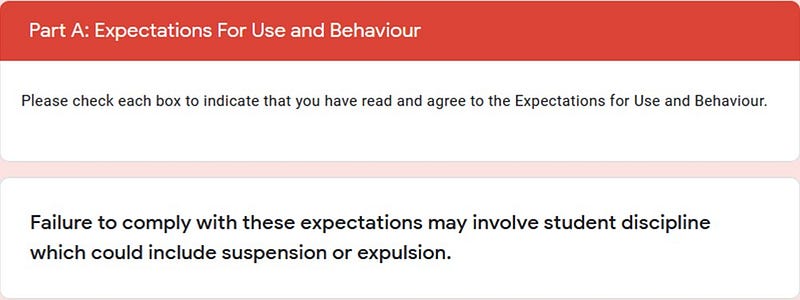Pandemic Excuses Enable School Boards and Edtech Companies to Force Parental Consent for Student Data Collection
With the vastly expanded use of remote learning during the Covid-19 pandemic, some school boards are taking the extraordinary step of forcing parents and students to agree to risky data collection practices and privacy-invasive technologies.
Months after the start of the new year, some public boards are apparently realizing that their rush to adopt educational technologies may result in more data collection than initially thought, and as everyone knows, once that data is collected, it’s impossible to get it back.
According to the Auditor General’s report on cybersecurity, many if not most Ontario school boards struggle to grasp basic concepts of cybersecurity and privacy, let alone ensure that teachers are properly educated to protect student information. But if there is one thing that school boards are keenly aware of, it’s the sensitivity of the information captured from children on a daily basis.
Abuse of the Claim to Modernization
Student data is no longer limited to a name and a student number. It now includes precise location information, sensitive communications, classroom photos, contact information and details of health conditions. Many other facets of children’s identities are collected and tracked across the student’s academic life and shared with anyone who has access to the hyperconnected technologies adopted by school administrators.
Many of these technologies are the brainchild of opportunistic entrepreneurs, developed by interface designers with little to no understanding of privacy and security. Worse yet, they have been adopted by untrained school board administrators using procurement processes that not only pre-date the pandemic, but also the Internet itself.
The chance of some of these cloud-based tools to protect student privacy is slim to none, and most students have already been enrolled in online classes, registered with videoconferencing tools and continue to be tracked using invasive data collection methods. Indeed, student information systems (SIS) or student management systems (SMS) often aggregate all identity and academic information, storing it outside the traditional confines of school board servers. Such cloud-based data processing enables edtech providers to ‘partner’ with unnamed 3rd and 4th parties to slice and dice collected data and even share some of this ‘intel’ with the school boards themselves, ostensibly with an eye towards improving education and even “modernizing student record management”.
Although the early years of edtech were rocky, with vast breaches impacting millions of students worldwide, the industry managed to survive and what’s more, many of the companies that built their models on data collection are still around, now valued at hundreds of millions of dollars. The value of that data is derived purely from children’s information collected during school-related activities in an unprecedented data grab only made possible by invasive technologies.
You’re Either With Us or Against Us
2021 promises to be a different beast however, with regulations and privacy legislation tightening the noose not only around rapacious edtech firms but also the publicly funded boards of education that have enjoyed no regulatory oversight for their privacy and security activities. Fearing that their surreptitious information collection and sharing practices might expose them to liability, shrewd school board administrators are abruptly putting their foot down and forcing a slew of consent requirements upon parents and students, to ensure that their use of privacy-invasive tools and arbitrary data collection techniques continues without the looming threat of a reckoning.

Today hundreds of thousands of Canadian families are receiving emails requiring the completion of forms that, under duress, require explicit agreement, going so far as to indicate that “Failure to comply with these expectations may involve student discipline which could include suspension or expulsion”. The letters continue across multiple screens and dozens of checkboxes that must be filled in to satisfy the new requirements.
All the while, authority is reiterated by such dubious statements as “Authorization for the collection of this information is in the Education Act, the Municipal Freedom of Information and Protection of Privacy Act, as amended. Users of this information include but are not limited to the Principal of your child’s school. This form will be kept for a minimum period of one calendar year. Contact person concerning this collection is the home school principal. “ Emphasis my own to illustrate the fact that this statement indicates the Board’s belief that the Education Act, which pre-dates the Internet itself, gives it authority to share student data with any organization in the world, any entity and for an unlimited duration.
What Can Parents Do?
As always, when the expansion of authority is presented under the guise of privacy and safety, the newspeak never fails to use vague technical language. In this case, the rhetoric is richly adorned with mentions of “synchronous learning tools”, digital tools and “communication tools for student and family engagement”. The newspeak is loud and clear: “To help protect the safety and privacy of all, the following expectations for use must be observed by all” but no mention is made of the individual data sharing practices of each tool, its investors and the rigorous, modern process that should have been used to select it and securely configure these platforms.
Such simple assurances constitute the most basic show of respect for families and children, especially as the consent sought will impact students well into adulthood. As such, in exchange for the Board’s request for indemnity, parents should unequivocally take a stand and protect their families by requiring sufficient information to be comfortable with relinquishing the digital identities of their children to a variety of strangers. In the failing case, and perhaps as a better solution, parents can request urgent investigation into the veiled threats of discipline and marginalization made by their School Board towards youngsters.

